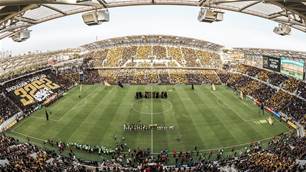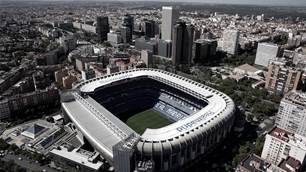THE problem: The world's biggest club hasn't won anything in years. The solution: Jose Mourinho...
The problem
All the players want to be the star...
A former Real Madrid coach sits in a restaurant in northern Madrid and waves at the staff buzzing around. "Imagine this restaurant is Real Madrid," he says. "Everyone wants to be the maitre d'. No one wants to wash the plates, or
cook the food, or wait on the table."
One youth-teamer given his opportunity with the first team couldn't believe his eyes: "The players just did whatever they felt like doing."
Worse, the club institutionalised the star complex. A black 4x4 draws up outside the Bernabeu. At the wheel, a Madrid first-team player. On the side of the stadium hangs a gigantic banner depicting the club's galacticos. The driver sighs: "You'd think they were the only bloody players at the club."
On another occasion, one day at Madrid's training ground, the players were halfway through a session when they saw Perez striding across the pitch with someone in tow. The person in question was the ambassador to somewhere or other and quite fancied meeting David Beckham.
So Perez did the honours, while the rest of the squad looked on.
The solution
Remind them that you're the star. Show them that by doing it your way they'll get better - individually and collectively...
The first day Mourinho took over at Porto, he handed out his rulebook. The first commandment was simple: no one is bigger than the club. He also made them a promise: do things my way and we will win. There was
a blunt advisory message for Cristiano Ronaldo during Mourinho's presentation: if, said Mourinho, he gives everything for the club, he can be the best player in the world. If.
At Chelsea the message was the same: "If the bigger stars with the biggest egos understand the team comes first, we have a fantastic side."
It's not just words, either: Mourinho really means it, working tactically and technically with the players to improve them, convincing them of their value when they doubt it - constantly telling them how good they are. Samuel Eto'o played on the right for Inter and never said a word; Samuel Eto'o played on the right for Cameroon at the World Cup and did his nut.
Drogba sums it up perfectly: "Before Mourinho came to Chelsea few people had really heard of John Terry, Frank Lampard, Arjen Robben or myself - we were not world famous. That came through the group." The message is reinforced by Mourinho's penchant for picking the least glamorous players when it comes to holding them up as an example. When young upstart Mario Balotelli repeatedly let the side down last year, he retorted: "If you train with Cambiasso and Zanetti every day and don't improve, you only have one neurone."
His choice of players was no coincidence.
The problem
All that's well and good but your football is a bit, well, dull...
For anyone to describe your football as "s*** on a stick" stings. When that person rants about how you've made short passes, feints, nutmegs, back-heels and one-twos extinct, who reckons you want to stamp out any creative licence, it really stings. And when that person accuses you of wanting to control your players because you were never good enough to be one yourself, it stings like hell. Still, it could be worse: that person could be your boss. Oh.
In May 2007, Jorge Valdano accused Mourinho of taking football into a dark future, where fans had "better be ready to wave goodbye to any expression of the cleverness and talent we have enjoyed for a century". That's Jorge Valdano, the Madrid director general. Jorge Valdano, Jose Mourinho's new boss. Imagine what everyone else is saying. Imagine what that says about Madrid, the club that sacked a European Cup winner and the last two coaches to win the league - because they were too boring. Madrid's pursuit, Perez insisted, is "excellence"; they must "win
and fascinate".
At Chelsea, Mourinho complained Spurs "brought the bus and left it in front of the goal," introducing a whole new concept to the English game: parking the bus. "I would have been frustrated if I had been a supporter who paid £50 ($90) to watch Spurs defend." He might as well have introduced Mr Pot to Mrs Kettle. As Van Gaal put it: "My philosophy is to entertain; Mourinho's is just to win."
Mourinho is prickly about accusations of being defensive. But it did not stop him admitting that while he learnt much from Robson at Barcelona, what he added was "defensive organisation". That means strong centre-backs who only defend - "you've got enough to worry about defending without going up the pitch," he says - as well as a powerful midfield and strikers who take chances.
"I'm not interested in a player who scored three from 15 opportunities; I want one who scored from his only opportunity." UEFA's technical director Andy Roxburgh, who led a Scottish coaching course Mourinho attended to get his license, recalls that his biggest obsessions were "transitions" - from defence to attack and vice versa. Counter-attacks, in other words.
When Italian TV found his notes after one game, they were struck by his insistence that Maxwell was two metres too far forward. Every aspect of the opposition is pored over. This doesn't really fit the Madrid way; they're not supposed to worry about the opposition - they're supposed to blow them away with style and substance.
Against Barcelona in the Champions League, Mourinho insisted he did not park the bus. He had, in fact, "parked a plane - with its wings out". Yes, three strikers played, but Pandev became a runner and Samuel Eto'o an auxiliary right-back. Most people at Inter didn't care. Nor did they care when Porto won the European Cup, even as up in La Coruna, where their team lost to Porto in the semi-final, they complained: "He looks like a gents' hairstylist but he sends his teams out with hatchets." At Madrid, they care.
The solution
Tell them they're wrong. Remind them that you won. And remind them just how desperate they are to do the same...
Mourinho keeps a notebook with every little detail from his entire career in it. And the evidence, though skewed, is exhaustively gathered and impeccably presented. Mourinho was quick to defend himself at his presentation. "I have been in three European finals," he said, "and scored eight goals."
In Italy, the battle to prove his attacking credentials appeared never-ending - and increasingly bitter. Inter, Mourinho reminded reporters, had scored more goals than any of the last 10 winners of Serie A. And they beat Barcelona 3-1 - making them the only team to have defeated Pep Guardiola's side by more than a solitary goal.
As for the tactics, pragmatism is the key. Against Barcelona, his was a genuine tactical innovation: give them the ball, and let them play. "Do you really want me to compete for possession with them?" Mourinho asked.
"And lose? If you have a Ferrari and I have some small car, I have to puncture your tires. Or put sugar in your petrol tank."
At Madrid he will have a Ferrari. But right now, for all the barbed remarks in the press, Madrid don't care as much about winning pretty as they would like to think. And Mourinho won the European Cup. Madrid want the European Cup - so much so that they've publicly swallowed their own identity. "Madrid is all about winning," insisted Perez, hastily glossing over everything he'd said before. Valdano fell on his sword in front of the entire press corps, Mourinho's presentation beginning with him saying a very public, very pathetic sorry.
When he departed, Pellegrini moaned that a record-breaking season was not enough to keep him in a job. "The next manager will have to rack up 100 points and over 100 goals," he said. Or, Pellegrini's critics were quick to
retort, actually win something.
The problem
Erm, aren't you actually a bit, well, Barcelona underneath it all?
The video is still on YouTube and it hasn't gone unnoticed. Mourinho on a balcony in Barcelona, chanting: "Today, tomorrow and always with Barça in my heart." Mourinho was once a rabid Barcelona acolyte, prepared to wind up Madrid and spout anti-Catalan conspiracies with the best of them.
The solution
Make an enemy of them...
Asked if he would ever go back to Barcelona as coach earlier this year, Mourinho replied simply: "It's impossible now." That's thanks to attacks on Catalan "theatre", accusations against referees and slurs against Lionel Messi, with his constant winding up during the last few years - plus of course the comically uptight reaction of Barcelona fans in taking the moral high ground. Mourinho revelled in telling Luis Figo: "You should thank me - you're no longer the most hated man in Catalonia."
Problem solved. But what about Madrid's claim to be a gentleman's club? Pah! Mourinho's Barcelona past just twisted the knife in Catalan backs. And when he beat Barcelona this season, happily decrying the Catalans' "obsession" with Madrid, they loved it even more. Who cares if it was boring, defensive or cynical - it screwed over Barça!
By the time he'd won the competition, he had become the perfect candidate. Mourinho won the European Cup and he beat Barcelona. Now's he's got to do it all again.
This article appeared in the August issue of FourFourTwo magazine. To buy back copies of this issue call 03-8317-8121 with a credit card to hand.
Related Articles

What A-League clubs can learn from MLS dazzlers LAFC

An Aussie in the MLS: Zlatan, LA Galaxy and me












